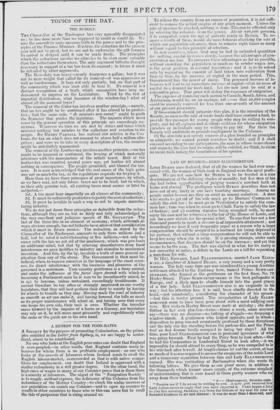TOPICS OF THE DAY.
THE BUDGET.
THE Chancellor of the Exchequer has very agreeably disappointed us ; he has done more than we supposed he could or would do. We owe the umende in some measure both to the power and to the prin- ciples of the Finance Minister. It is true, the reduction for the present year will not be great, but we are not to undervalue the ,gift because its arrival is delayed until it can .be made freely. The principles which the reductions involve we cifficeive to be even more valuable than the reductions themselves. The only argument hitherto thought necessary in support of a tax has been its amount ; in future it must be defended by other arguments. The Beer-duty was heavy—nearly fourpence a gallon ; hut it was not its mere weight that called for its removal—it was oppressive as well as burdensome. It bore not only partially, but on that part of the community which was least able to bear it. Its removal is a distinct recognition of a truth which .economists have long en- deavoured to impress on the Legislature. Tried by the test of impartial distribution, what becomes of the window-tax ? what of almost all the assessed taxes?
The removal of the Cider-tax involves another principle,—namely, that no tax ought to be continued after it has ceased to be produc- tive; that the same rule, " de nzinimis non eurat," ought to guide the financier that guides the legislator. The imposts which must cease by the general operation of this principle are exceedingly nu- merous. Wherever we turn we are met by duties and taxes which minister nothing but salaries to the collectors and vexation to the people. Sir HENRY PARNELL has noticed 510 articles in the Cus toms, the tax on which does not amount to above half a million alto- gether; and were we to take in every description of tax, the number se • 7 might be indefinitely augmented. The removal of the Leather-tax involves another principle,—no tax ought to be imposed or continued, the levying of which materially interferes with the manufacture of the article taxed. Half of the leather-tax was remitted several years ago, yet leather fell almost nothing in consequence. The people grumbled, and blamed the tan- ners. It is now acknowledged that the real cause of the high price was not so much the tax, as the regulations requisite for levying it. Here then we have three principles of great importance, by which, as we have said, not only future taxes are to be tried, but to which, as their only genuine test, all existing taxes must sooner or later be subjected,- 1st, A tax must bear impartially on all classes of the community ; 2d, It must be sufficiently productive to justify the cost of collection ; 3d, It must be leviable in such a way as not to impede manufac- turing industry. We do not put down these principles as deducible from the reduc- tions, although they are so, but as fairly and fully acknowledged in the very excellent and judicious speech of Mr. GOULBURN. The last of the three lets in an element of economy, which, althcrug.heal- ways obvious enough, has not hitherto been allowed that consideration which it must in future reeeive. The reduction, as stated by the Chancellor of the Exchequer, amounts to only three millions and a half, but he rated it notwithstanding at five millions,—not only be- cause with the tax we got rid of the machinery, which was pro tanto an additional relief, but that by relieving manufactures from fiscal interference we gave facilities to industry and stimulus to mechanical invention. And this, by the by, involves a truth of more general ap- plication than any of the above. The Government is then most be- neficial, when, to express ourselves in the language of the exact scien- ces, its direct interference with the business and pleasures of the governed is a minimum. Your country gentleman is a fussy animal, ahd under the influence of the furor leges ferendi with which on becoming a Parliament-man he is sure toe incontinently seized, he is apt to become, unless restrained, exceedingly troublesome. It cannot therefore be too often or strongly impressed on our worthy legislators, that they will best perform their duty to society by leaving its wheels to trundle as they may. Having made the road of industry as smooth as art can make it, and having lowered the tolls as much as its proper maintenance will admit of, and having seen that every one keeps his own side, their task is over. Whether the traveller move forward by the impulse of a horse or a Gurney, our legislators may rely on it, he will move most pleasantly and expeditiously while the reins or the guide are in his own hand.


















 Previous page
Previous page